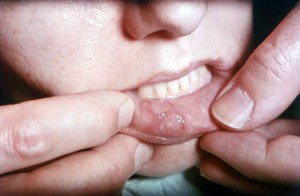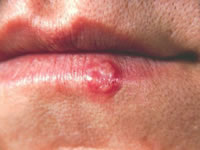There seems to be a lot of confusion between canker sores vs cold sores, two very common mouth disorders. They are not interchangeable, they are two very different types of sores, although both can be irritating and uncomfortable. Let’s look at key characteristics and differences.
Canker sores are not contagious while cold sores are very contagious.
Canker sores: Cause is Unknown
Canker sores, also know by the term aphthous ulcers or aphthous stomatitis, are not viral in nature and may arise from a variety of causes, the precise cause is not yet understood. Common triggers include physical trauma to the mouth such as accidentally biting the cheek or tongue or a loose orthodontic wire, stress, hormonal changes, irritants such as the sodium laurel sulfate commonly found in toothpastes, and food allergies or sensitivities. Canker sores are not contagious and cannot be transferred by kissing or other bodily contact or sharing beverages or utensils.
Cold Sores Caused by Virus
On the other hand, cold sores, also known as fever blisters, stem from the herpes simplex type 1 virus. There are two types, type 1 is usually the cause of oral herpes while type 2 is usually the cause of genital herpes. Once the person is exposed to the herpes simplex virus it stays in the body forever and can be reactivated due to stress, a lowered immune system or illness, or even excessive sunlight ore sunburn. The virus is extremely contagious when the blisters are present and can be passed on to another person by kissing or other bodily contact or from drinking from the same cup.
Physical Differences: Ulcer vs Blisters
Canker Sores
 Canker sores generally appear on the inside of the mouth, including cheeks, roof of mouth, tongue and under the tongue, and inside lip. They are generally whitish or gray round, flat ulcers with a bright red border. Some people just get one while others may get a small cluster. The main issue with canker sores is that they can hurt so darn much. If severe they can make eating, drinking and even talking very difficult. Mouth ulcers generally go away in about a week to 10 days on their own and do not leave scarring, with the exception of the type called Major Aphthae. Approximately 10 percent of mouth ulcers fall into this category. They are generally more than 12mm in size and can take up to six weeks to heal and they may leave a scar.
Canker sores generally appear on the inside of the mouth, including cheeks, roof of mouth, tongue and under the tongue, and inside lip. They are generally whitish or gray round, flat ulcers with a bright red border. Some people just get one while others may get a small cluster. The main issue with canker sores is that they can hurt so darn much. If severe they can make eating, drinking and even talking very difficult. Mouth ulcers generally go away in about a week to 10 days on their own and do not leave scarring, with the exception of the type called Major Aphthae. Approximately 10 percent of mouth ulcers fall into this category. They are generally more than 12mm in size and can take up to six weeks to heal and they may leave a scar.
In some instances canker sores may also be the sign of another illness, including Crohns disease, Celiac, Lupus and Behcet’s disease. On rare occasion what appears to be a canker sore could in fact be oral cancer. If your ulcer doesn’t heal within a couple of weeks it should be checked by a medical professional to rule out oral cancer or another underlying cause.
Cold Sores
 Fever blisters usually start with a tingling or burning sensation on the spot where you get the outbreak about 1-3 days before a sore appears. These sores are generally located on the outside of the mouth and adjacent area and are characterized by a cluster of small fluid-filled blisters that eventually pop, dry out and crust over into an ugly scab. They become less contagious as they heal, but if you have a cold sore you should avoid touching it so you don’t accidentally spread it to another part of your body or to someone else. Cold sores usually heal within about two weeks and do not leave scars. They are usually not as painful as canker sores, but they can be itchy. Mainly they are unsightly and annoying.
Fever blisters usually start with a tingling or burning sensation on the spot where you get the outbreak about 1-3 days before a sore appears. These sores are generally located on the outside of the mouth and adjacent area and are characterized by a cluster of small fluid-filled blisters that eventually pop, dry out and crust over into an ugly scab. They become less contagious as they heal, but if you have a cold sore you should avoid touching it so you don’t accidentally spread it to another part of your body or to someone else. Cold sores usually heal within about two weeks and do not leave scars. They are usually not as painful as canker sores, but they can be itchy. Mainly they are unsightly and annoying.
Treating Canker Sores
Aphthous ulcers can be treated with a variety of over-the-counter medications including products that contain Benzocaine that will numb the lesion, patches which help protect it and aid in healing, and mouth washes that help remove bacteria. There are also many home remedies for canker sores that you can try. Popular remedies include gargling with salt water or a combination of salt water and hydrogen peroxide, a product with bee propolis like Canker-Rid, aloe vera gel
, a paste of baking soda and water, milk of magnesia dabbed on the ulcer, alum, which can be found in the spice aisle at the supermarket, and apple cider vinegar mixed with aloe vera.
Treating Cold Sores
There is no cure for herpes simplex. Since they are caused by a virus the most effective treatment is usually an anti-viral drug called acyclovir. There are also several over-the-counter products that may help relieve the pain and itching. Two of the more popular ones are Abreva and Zilactin-B . Their main ingredients stem the sensory receptors and help with the itching and discomfort. Once the sore dries and crusts, it is important to keep it moist so it doesn’t crack and lead to a secondary infection.